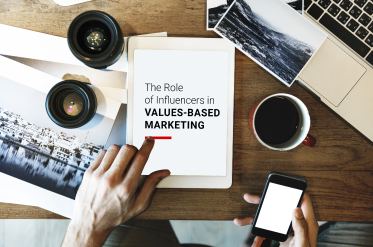The Emergence of Values-Based Marketing
In an era where customers align with brands that share their values, a shift is taking place in marketing. Brands are moving towards values-based marketing. Which is a strategy that involves aligning a brand’s values with those of its customers. This shift is not just a fleeting trend. It’s a crucial change in how brands communicate and connect with their audience.
In the past, marketing strategies were primarily product-centric. They focused on the features and benefits of the product. However, in today’s socially conscious world, customers are looking beyond the product. They are seeking brands that stand for something. That is, brands that reflect their values and beliefs. This shift towards values marketing is a response to this changing customer mindset.
The Role of Influencers in Values-Based Marketing

Influencers are becoming the carriers of a brand’s values and ethos. From sustainability to diversity. Influencers are championing causes, transforming their platforms into spaces for advocacy and awareness. But their role in marketing goes beyond just advocacy.
Influencers, with their authentic voices and engaged followers, are uniquely positioned to bring a brand’s values to life. They can tell compelling stories that resonate with their audience. Hence, creating a deeper emotional connection between the brand and its customers. This emotional connection is what drives customer loyalty and advocacy. Making influencers an integral part of marketing.
Values-Based Marketing Examples: A Showcase of Success
Values-based marketing examples abound in today’s digital landscape. These examples showcase how brands and influencers are aligning their values. And that’s to create more meaningful and impactful marketing campaigns.
For instance, Patagonia, an outdoor clothing and gear brand, is well-known for its commitment to sustainability. The brand collaborates with influencers who share this commitment. Thus, creating powerful content that not only promotes their products. But also raises awareness about environmental issues.
Another example is Dove’s Real Beauty campaign. The brand collaborated with influencers of all shapes and sizes. And that’s to challenge the traditional beauty standards and promote body positivity. This campaign resonated with many women, leading to increased brand loyalty and advocacy.
The Impact of Values-Based Marketing on Brand Loyalty
Values-based marketing is having a profound impact on brand loyalty. By aligning their values with those of their customers. Brands are fostering deeper connections and building stronger relationships.
When customers see that a brand shares their values, they feel appreciated. This emotional connection leads to increased trust and loyalty. Moreover, customers are more likely to advocate for a brand that stands for something they believe in. Which leads to powerful word-of-mouth marketing.
The Future of Values-Based Marketing
The future of values-based marketing looks promising. As more brands recognize the power of aligning their values with those of their customers. We can expect to see even more innovative and impactful campaigns.
Technology will play a crucial role in this future. With advancements in AI and data analytics. Brands will be able to gain deeper insights into their customers’ values and beliefs. This will allow them to create more personalized and relevant marketing campaigns.
Influencers will also continue to play a crucial role in marketing. As carriers of a brand’s values, they continue to transform their platforms into spaces for awareness. We can also expect to see more collaborations between brands and influencers. Leading to more authentic and impactful marketing campaigns.
Conclusion
The shift towards values-based marketing is more than just a passing fad. it’s a transformative shift in the marketing landscape. Influencers, as carriers of a brand’s values, are playing a crucial role in this shift. They are championing causes and transforming platforms into spaces for advocacy. The future of marketing is here, and it’s values-based. Want to know more about Influencer marketing and other services and how to implement them in your industry (hotel, tourism agency,…)? Visit our website, Brandfluence and read our blogs to stay in the loop, or simply contact us.
FAQs
What is values-based marketing? It is a strategy that involves aligning a brand’s values with those of its customers. It’s about creating meaningful connections and building stronger relationships.
What role do influencers play in values-based marketing? Influencers are becoming the carriers of a brand’s values and ethos. They’re championing causes and transforming their platforms into spaces for advocacy and awareness.
Can you provide some examples of values-based marketing? Examples include brands and influencers aligning their values. And that’s to champion causes such as sustainability and diversity.
How does values-based marketing impact brand loyalty? By aligning their values with those of their customers. Brands are fostering deeper connections and building stronger relationships. Hence, leading to increased brand loyalty.
What can we expect from the future of values-based marketing? As more brands recognize the power of aligning their values with those of their customers. We can expect to see even more innovative and impactful campaigns.
How does values-based marketing differ from traditional marketing? Unlike traditional marketing, which focuses on the features and benefits of the product. Such marketing focuses on the brand’s values and how they align with the customer’s values.
Why is values-based marketing important? It is important because it allows brands to create deeper emotional connections with their customers. Which leads to increased brand loyalty and advocacy. In today’s socially conscious world, customers are looking for brands that stand for something. Brands that reflect their values and beliefs.
How can brands implement values-based marketing? Brands implement values-based marketing by understanding their values. Then, align these values with those of their customers. This involves understanding the customer’s needs, beliefs, and values. Once the alignment is established, brands can then communicate their values. And that’s through various marketing strategies. Including content marketing, social media marketing, and influencer marketing.
Useful Links:


